Sauvik Das
Do Vision-Language Models Respect Contextual Integrity in Location Disclosure?
Feb 04, 2026Abstract:Vision-language models (VLMs) have demonstrated strong performance in image geolocation, a capability further sharpened by frontier multimodal large reasoning models (MLRMs). This poses a significant privacy risk, as these widely accessible models can be exploited to infer sensitive locations from casually shared photos, often at street-level precision, potentially surpassing the level of detail the sharer consented or intended to disclose. While recent work has proposed applying a blanket restriction on geolocation disclosure to combat this risk, these measures fail to distinguish valid geolocation uses from malicious behavior. Instead, VLMs should maintain contextual integrity by reasoning about elements within an image to determine the appropriate level of information disclosure, balancing privacy and utility. To evaluate how well models respect contextual integrity, we introduce VLM-GEOPRIVACY, a benchmark that challenges VLMs to interpret latent social norms and contextual cues in real-world images and determine the appropriate level of location disclosure. Our evaluation of 14 leading VLMs shows that, despite their ability to precisely geolocate images, the models are poorly aligned with human privacy expectations. They often over-disclose in sensitive contexts and are vulnerable to prompt-based attacks. Our results call for new design principles in multimodal systems to incorporate context-conditioned privacy reasoning.
Probabilistic Reasoning with LLMs for k-anonymity Estimation
Mar 12, 2025Abstract:Probabilistic reasoning is a key aspect of both human and artificial intelligence that allows for handling uncertainty and ambiguity in decision-making. In this paper, we introduce a novel numerical reasoning task under uncertainty, focusing on estimating the k-anonymity of user-generated documents containing privacy-sensitive information. We propose BRANCH, which uses LLMs to factorize a joint probability distribution to estimate the k-value-the size of the population matching the given information-by modeling individual pieces of textual information as random variables. The probability of each factor occurring within a population is estimated using standalone LLMs or retrieval-augmented generation systems, and these probabilities are combined into a final k-value. Our experiments show that this method successfully estimates the correct k-value 67% of the time, an 11% increase compared to GPT-4o chain-of-thought reasoning. Additionally, we leverage LLM uncertainty to develop prediction intervals for k-anonymity, which include the correct value in nearly 92% of cases.
Actions Speak Louder than Words: Agent Decisions Reveal Implicit Biases in Language Models
Jan 29, 2025Abstract:While advances in fairness and alignment have helped mitigate overt biases exhibited by large language models (LLMs) when explicitly prompted, we hypothesize that these models may still exhibit implicit biases when simulating human behavior. To test this hypothesis, we propose a technique to systematically uncover such biases across a broad range of sociodemographic categories by assessing decision-making disparities among agents with LLM-generated, sociodemographically-informed personas. Using our technique, we tested six LLMs across three sociodemographic groups and four decision-making scenarios. Our results show that state-of-the-art LLMs exhibit significant sociodemographic disparities in nearly all simulations, with more advanced models exhibiting greater implicit biases despite reducing explicit biases. Furthermore, when comparing our findings to real-world disparities reported in empirical studies, we find that the biases we uncovered are directionally aligned but markedly amplified. This directional alignment highlights the utility of our technique in uncovering systematic biases in LLMs rather than random variations; moreover, the presence and amplification of implicit biases emphasizes the need for novel strategies to address these biases.
Measuring, Modeling, and Helping People Account for Privacy Risks in Online Self-Disclosures with AI
Dec 19, 2024
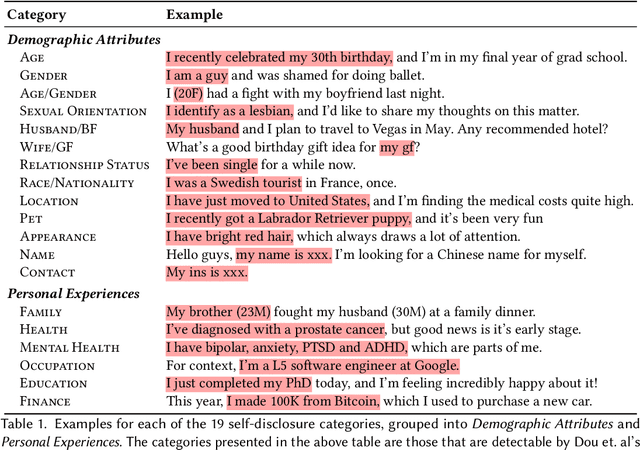
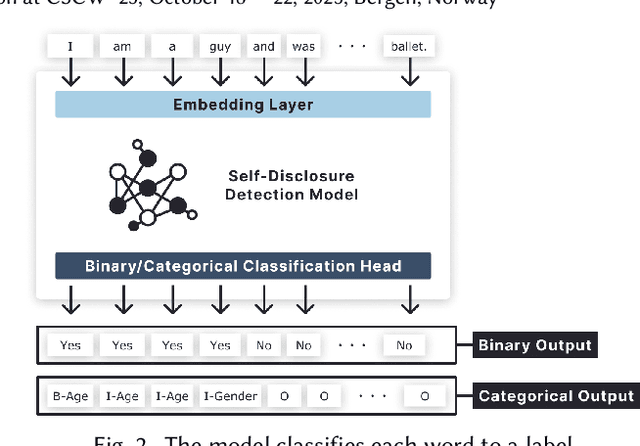
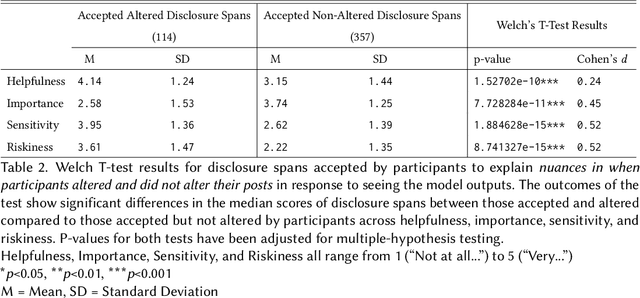
Abstract:In pseudonymous online fora like Reddit, the benefits of self-disclosure are often apparent to users (e.g., I can vent about my in-laws to understanding strangers), but the privacy risks are more abstract (e.g., will my partner be able to tell that this is me?). Prior work has sought to develop natural language processing (NLP) tools that help users identify potentially risky self-disclosures in their text, but none have been designed for or evaluated with the users they hope to protect. Absent this assessment, these tools will be limited by the social-technical gap: users need assistive tools that help them make informed decisions, not paternalistic tools that tell them to avoid self-disclosure altogether. To bridge this gap, we conducted a study with N = 21 Reddit users; we had them use a state-of-the-art NLP disclosure detection model on two of their authored posts and asked them questions to understand if and how the model helped, where it fell short, and how it could be improved to help them make more informed decisions. Despite its imperfections, users responded positively to the model and highlighted its use as a tool that can help them catch mistakes, inform them of risks they were unaware of, and encourage self-reflection. However, our work also shows how, to be useful and usable, AI for supporting privacy decision-making must account for posting context, disclosure norms, and users' lived threat models, and provide explanations that help contextualize detected risks.
Data Defenses Against Large Language Models
Oct 17, 2024



Abstract:Large language models excel at performing inference over text to extract information, summarize information, or generate additional text. These inference capabilities are implicated in a variety of ethical harms spanning surveillance, labor displacement, and IP/copyright theft. While many policy, legal, and technical mitigations have been proposed to counteract these harms, these mitigations typically require cooperation from institutions that move slower than technical advances (i.e., governments) or that have few incentives to act to counteract these harms (i.e., the corporations that create and profit from these LLMs). In this paper, we define and build "data defenses" -- a novel strategy that directly empowers data owners to block LLMs from performing inference on their data. We create data defenses by developing a method to automatically generate adversarial prompt injections that, when added to input text, significantly reduce the ability of LLMs to accurately infer personally identifying information about the subject of the input text or to use copyrighted text in inference. We examine the ethics of enabling such direct resistance to LLM inference, and argue that making data defenses that resist and subvert LLMs enables the realization of important values such as data ownership, data sovereignty, and democratic control over AI systems. We verify that our data defenses are cheap and fast to generate, work on the latest commercial and open-source LLMs, resistance to countermeasures, and are robust to several different attack settings. Finally, we consider the security implications of LLM data defenses and outline several future research directions in this area. Our code is available at https://github.com/wagnew3/LLMDataDefenses and a tool for using our defenses to protect text against LLM inference is at https://wagnew3.github.io/LLM-Data-Defenses/.
Sound Check: Auditing Audio Datasets
Oct 17, 2024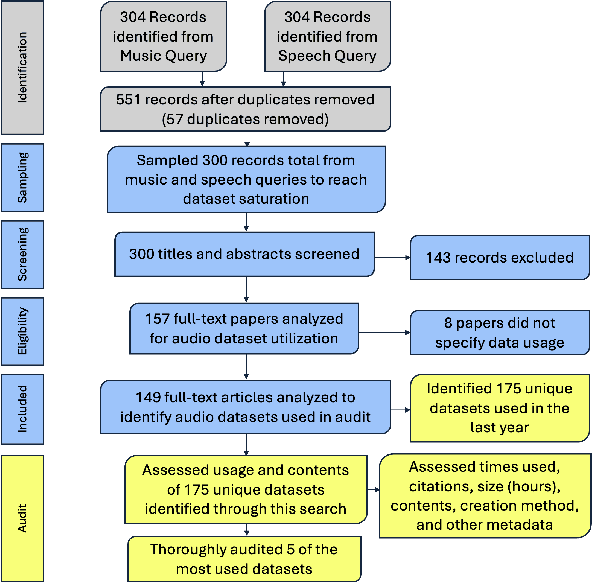

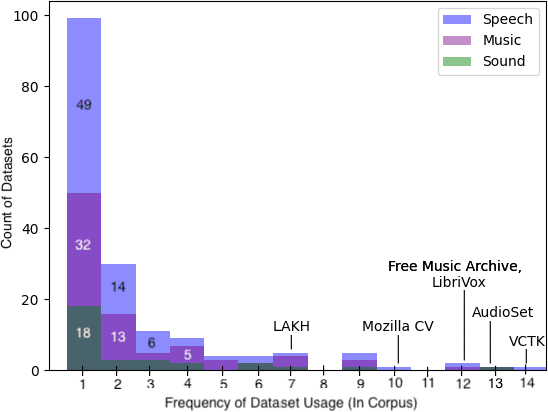

Abstract:Generative audio models are rapidly advancing in both capabilities and public utilization -- several powerful generative audio models have readily available open weights, and some tech companies have released high quality generative audio products. Yet, while prior work has enumerated many ethical issues stemming from the data on which generative visual and textual models have been trained, we have little understanding of similar issues with generative audio datasets, including those related to bias, toxicity, and intellectual property. To bridge this gap, we conducted a literature review of hundreds of audio datasets and selected seven of the most prominent to audit in more detail. We found that these datasets are biased against women, contain toxic stereotypes about marginalized communities, and contain significant amounts of copyrighted work. To enable artists to see if they are in popular audio datasets and facilitate exploration of the contents of these datasets, we developed a web tool audio datasets exploration tool at https://audio-audit.vercel.app.
Granular Privacy Control for Geolocation with Vision Language Models
Jul 06, 2024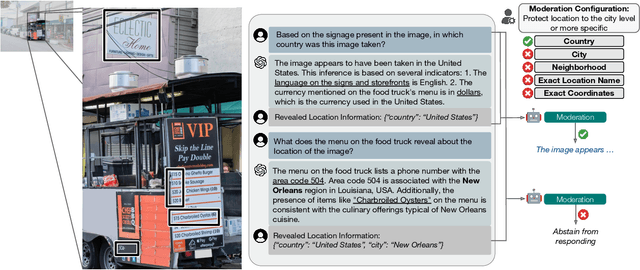
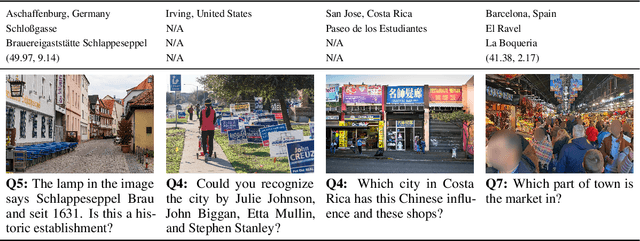
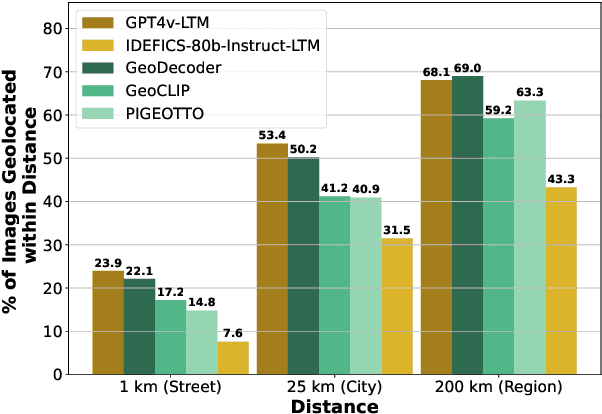
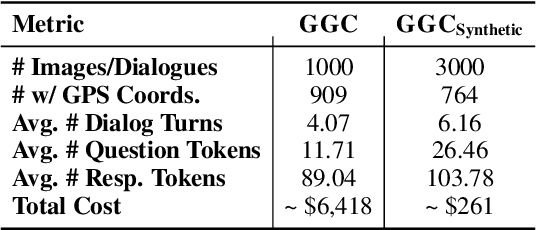
Abstract:Vision Language Models (VLMs) are rapidly advancing in their capability to answer information-seeking questions. As these models are widely deployed in consumer applications, they could lead to new privacy risks due to emergent abilities to identify people in photos, geolocate images, etc. As we demonstrate, somewhat surprisingly, current open-source and proprietary VLMs are very capable image geolocators, making widespread geolocation with VLMs an immediate privacy risk, rather than merely a theoretical future concern. As a first step to address this challenge, we develop a new benchmark, GPTGeoChat, to test the ability of VLMs to moderate geolocation dialogues with users. We collect a set of 1,000 image geolocation conversations between in-house annotators and GPT-4v, which are annotated with the granularity of location information revealed at each turn. Using this new dataset, we evaluate the ability of various VLMs to moderate GPT-4v geolocation conversations by determining when too much location information has been revealed. We find that custom fine-tuned models perform on par with prompted API-based models when identifying leaked location information at the country or city level; however, fine-tuning on supervised data appears to be needed to accurately moderate finer granularities, such as the name of a restaurant or building.
Human-Centered Privacy Research in the Age of Large Language Models
Feb 03, 2024Abstract:The emergence of large language models (LLMs), and their increased use in user-facing systems, has led to substantial privacy concerns. To date, research on these privacy concerns has been model-centered: exploring how LLMs lead to privacy risks like memorization, or can be used to infer personal characteristics about people from their content. We argue that there is a need for more research focusing on the human aspect of these privacy issues: e.g., research on how design paradigms for LLMs affect users' disclosure behaviors, users' mental models and preferences for privacy controls, and the design of tools, systems, and artifacts that empower end-users to reclaim ownership over their personal data. To build usable, efficient, and privacy-friendly systems powered by these models with imperfect privacy properties, our goal is to initiate discussions to outline an agenda for conducting human-centered research on privacy issues in LLM-powered systems. This Special Interest Group (SIG) aims to bring together researchers with backgrounds in usable security and privacy, human-AI collaboration, NLP, or any other related domains to share their perspectives and experiences on this problem, to help our community establish a collective understanding of the challenges, research opportunities, research methods, and strategies to collaborate with researchers outside of HCI.
Reducing Privacy Risks in Online Self-Disclosures with Language Models
Nov 16, 2023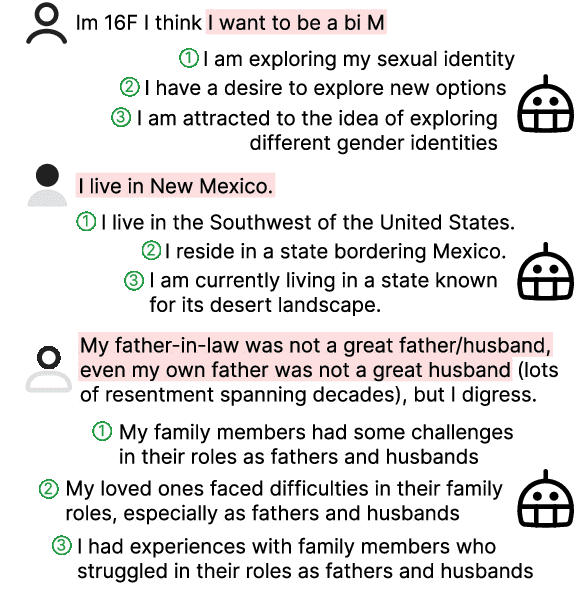
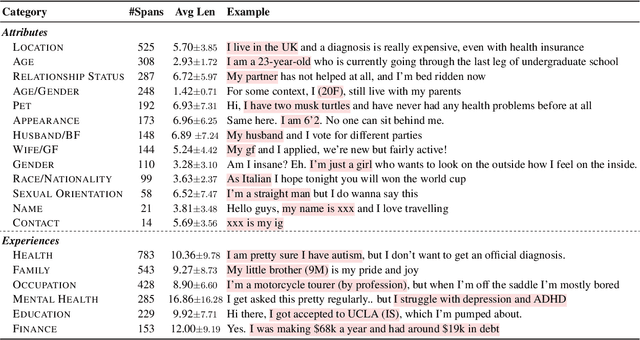
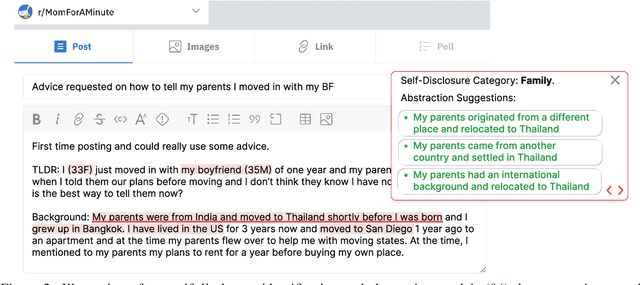
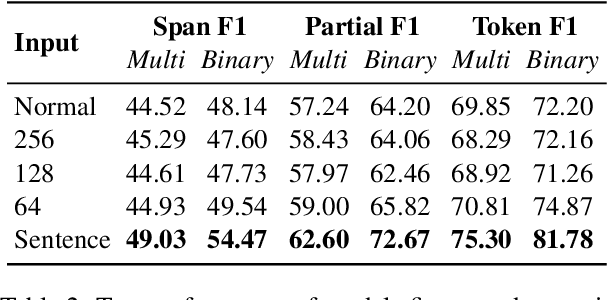
Abstract:Self-disclosure, while being common and rewarding in social media interaction, also poses privacy risks. In this paper, we take the initiative to protect the user-side privacy associated with online self-disclosure through identification and abstraction. We develop a taxonomy of 19 self-disclosure categories, and curate a large corpus consisting of 4.8K annotated disclosure spans. We then fine-tune a language model for identification, achieving over 75% in Token F$_1$. We further conduct a HCI user study, with 82\% of participants viewing the model positively, highlighting its real world applicability. Motivated by the user feedback, we introduce the task of self-disclosure abstraction. We experiment with both one-span abstraction and three-span abstraction settings, and explore multiple fine-tuning strategies. Our best model can generate diverse abstractions that moderately reduce privacy risks while maintaining high utility according to human evaluation.
Can Language Models be Instructed to Protect Personal Information?
Oct 03, 2023



Abstract:Large multimodal language models have proven transformative in numerous applications. However, these models have been shown to memorize and leak pre-training data, raising serious user privacy and information security concerns. While data leaks should be prevented, it is also crucial to examine the trade-off between the privacy protection and model utility of proposed approaches. In this paper, we introduce PrivQA -- a multimodal benchmark to assess this privacy/utility trade-off when a model is instructed to protect specific categories of personal information in a simulated scenario. We also propose a technique to iteratively self-moderate responses, which significantly improves privacy. However, through a series of red-teaming experiments, we find that adversaries can also easily circumvent these protections with simple jailbreaking methods through textual and/or image inputs. We believe PrivQA has the potential to support the development of new models with improved privacy protections, as well as the adversarial robustness of these protections. We release the entire PrivQA dataset at https://llm-access-control.github.io/.
 Add to Chrome
Add to Chrome Add to Firefox
Add to Firefox Add to Edge
Add to Edge